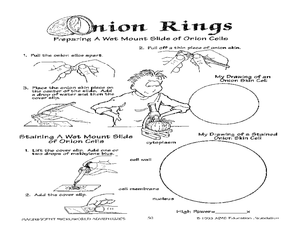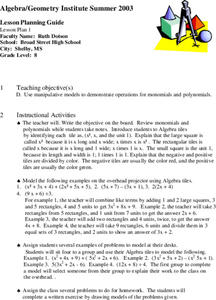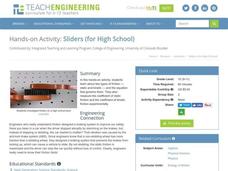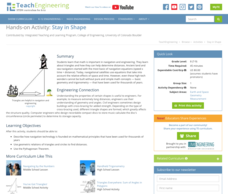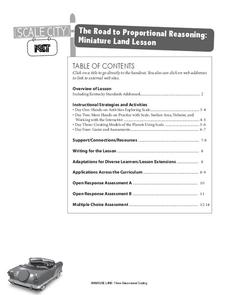Curated OER
Jelly Bean Math
Students estimate, measure, compute, and create patterns using jelly beans. In small groups, they solve various calculations, place jelly beans into groups, invent a new flavor, create a pattern, and complete a worksheet.
Curated OER
Activity Plan Mixed Ages: Friendship Soup
Students learn creative cooking. In this early childhood lesson plan, students children work together to plan, buy, and prepare a soup for their lunchtime meal.
Curated OER
Tracking Fall's Falling Temperatures
Young meteorologists track weather from day to day and record results on graphs, maps, or other places. They see firsthand how weather temperatures trend cooler as fall progresses and practice grade-appropriate skills in geography (map...
Curated OER
Quilts and Math
Students create a pattern. In this patterns instructional activity, students review the meaning of symmetry and explore using pattern blocks. Students look for patterns in real quilts, photographs and pictures. Students work...
Curated OER
Rock On
Students analyze trends in the Grammy Award winners this year and create graphs displaying their findings.
Curated OER
Find Someone
Your class will participate in a series of math vocabulary activities to learn about parallel lines. They find people using a math list and connect math words in the context of sentences. They also read the math words in the example...
Curated OER
Clocks and Time
Second graders observe and demonstrate how to tell and write time. They discuss different ways and things that tell time, then listen to a teacher-led lecture about the hands on a clock. Students complete a worksheet along with the...
Curated OER
Handy Reflections
Learners explore reflections on a coordinate plane in this lesson. They trace their hand on a grid, determine the coordinates of each point, and create a scatter plot of their points. Pupils use this information to investigate aspect...
Curated OER
Random Times
In this telling time worksheet, students read the digital times for each example and draw the hands on the clock to show the time 15 minutes later. Students complete 15 problems.
Curated OER
Onion Cells
Students observe the cells of an onion by wet mounting it and viewing it in a microscope. In this hands on lesson students make their own wet mount slide of an onion and are able to identify the cells in it such as, the nucleus,...
Curated OER
Exact or Estimation
Young scholars solve problems using estimation and exact calculations. In this algebra lesson, students use gum balls and thread to create hands on manipulatives to solve problems. They calculate the average of their total data.
Curated OER
Decimals Anyone?
Seventh graders compare and order decimals. Given a set of integers, they compare them using inequalities. In groups, 7th graders participate in hands-on decimal activities. Using string, paper clips and decimal cards, classmates...
Curated OER
Probability
Fifth graders study probability of events. They predict outcomes, and participate in hands-on experiments to find the probability of specified events. Afterward, 5th graders write probability of events in fractions and decimals.
Curated OER
Time Trials
Students investigate speed, time and distance. In this algebra instructional activity, students utilize their knowledge of linear equations to solve problems related to time, speed and distance. This assignment is hands on using two toy...
Curated OER
Models with monomials and polynomials
High schoolers participate in a activity that focuses on the concepts of combining monomials to make polynomial expressions. They use algebra tiles to complete the exercises in the activity. This is hands-on learning with successive...
Curated OER
Polynomials
Eighth graders investigate the concepts and combining them into polynomials. The teacher uses direct instruction for delivery. They can use Algebra to make this lesson hands-on for the benefit of kinesthetic learners.
Teach Engineering
Can You Resist This?
Some things are hard to resist. Small collaborative groups build circuits and calculate the voltage using Ohm's Law. Budding engineers explore the connection between the voltage across different resistors and linear...
Education World
Predicting Pumpkins
If you want more pumpkin seeds, you should get a bigger pumpkin—right? Young harvesters use estimation skills to make a hypothesis about how many seeds they will find in a pumpkin before examining the real number inside.
Teach Engineering
Gumdrop Atoms
There's nothing sticky about the resource, unless you count the gumdrops! Scholars create a model of a lithium atom, complete with protons, neutrons, and electrons. It's just that these models are made with gumdrops and toothpicks.
Teach Engineering
Sliders (for High School)
Slip sliding away. Groups investigates the two types of friction by running an experiment that allows them to calculate the coefficient of static friction and the coefficient of kinetic friction. The experiment uses a box, a...
Kenan Fellows
Density
Most scholars associate density with floating, but how do scientists determine the exact density of an unknown liquid? The third lesson in a seven-part series challenges scholars to find the mass and volume of two unknown liquids. Each...
Teach Engineering
Stay in Shape
Using their knowledge of right triangles, pupils find out how far a ship is from a light house. Class members determine how far around the world a ship would be sailing at a constant speed.
Kentucky Educational Television
The Road to Proportional Reasoning
Just how big would it really be? Young mathematicians determine if different toys are proportional and if their scale is accurate. They solve problems relating scale along with volume and surface area using manipulatives. The...
Teach Engineering
Bouncing Balls
How high will it bounce? Groups determine the height different balls bounce off of different surfaces. By performing the necessary calculations, they determine the initial and final momentum of the balls. The included worksheet provides...











